Myanmar earthquake: Death toll expected to exceed 3000
Myanmar quake rescuers are defying the odds with survivors still being found. It comes as rescue dogs in Thailand are doubling as emotional support pets for families desperately waiting for news.
Asia
Don't miss out on the headlines from Asia. Followed categories will be added to My News.
Rescuers in Myanmar have saved the life of a woman in her 60s who spent nearly four days trapped beneath earthquake rubble,
While the rule of the thumb is chances of a successful rescue plummet after 72 hours, the 63-year-old was found alive 91 hours after she was buried underneath a building in Naypyitaw according to the fire department.
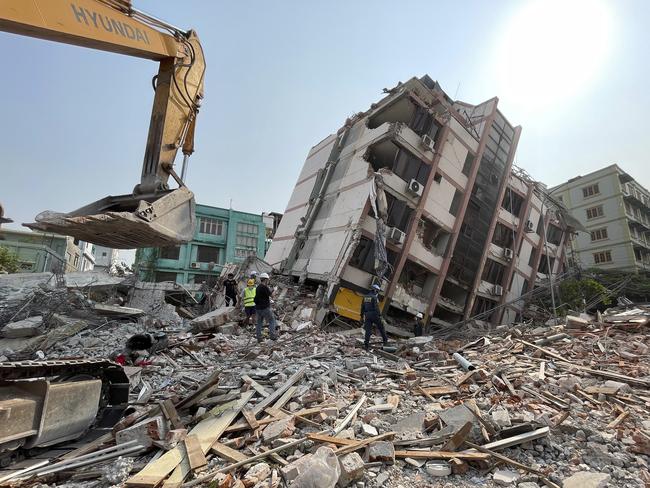
The death toll from the earthquake in Myanmar has risen above 2700, the head of the country’s ruling junta said on Tuesday, with more than 4500 people injured.
Min Aung Hlaing said 2719 people were confirmed dead and 441 still missing after Friday’s shallow 7.7-magnitude quake
In Thailand, search and rescue dogs are taking on the role of emotional support animals for grieving relatives of victims of a Bangkok skyscraper flattened in the deadly earthquake.
The 30-storey high-rise under construction collapsed in seconds on Friday when the earthquake struck neighbouring Myanmar, with effects felt as far as the Thai capital.
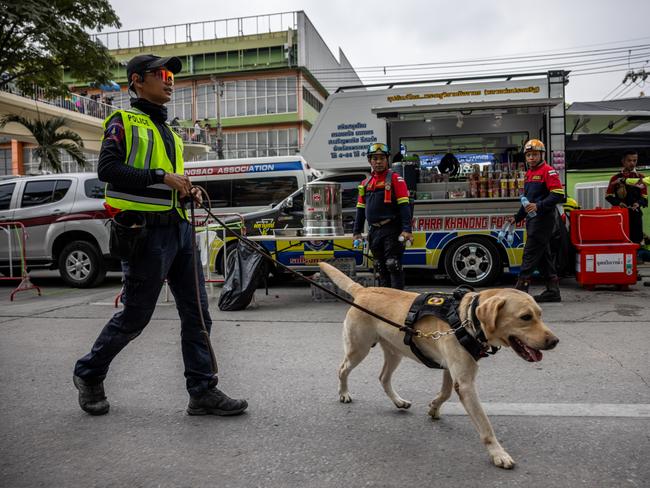
As of Tuesday, 13 people – thought to be on-site construction workers – were pronounced dead, with nine injured and more than 70 still believed to be buried in the rubble.
Their tearful families waited near the scene of the collapse, watching on with hopes fading as rescue workers and diggers scraped through the mountain of rubble.
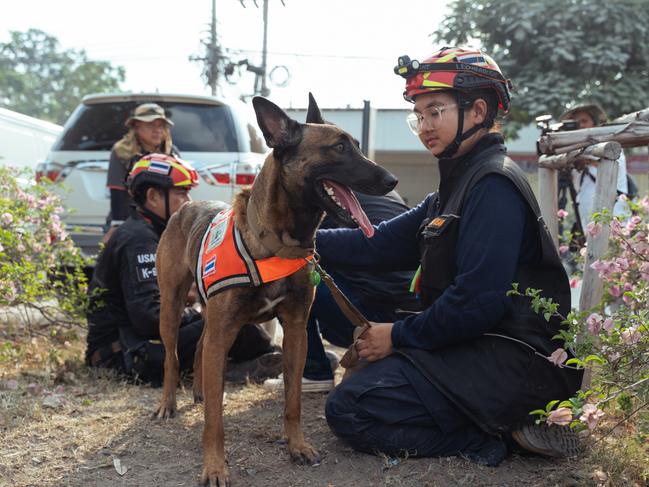
But their faces lit up when they saw golden retrievers Lek and Safari – decked out in official search uniforms – brought to the relatives’ waiting area.
Several canine teams have been deployed to help the search and rescue operation at the site, including from the military and police.
Rescue workers have recruited 11 dogs – not just in their usual capacity sniffing through the debris for signs of life, but also as emotional support for victims’ friends and relatives.
Alongkot Chukaew, deputy director of K9 USAR (urban search and rescue) Thailand, which handles the trained canines, said his team had learned from experience during the Turkey earthquake in 2023 that the dogs’ presence offered a light in the dark for those waiting for news of their families.
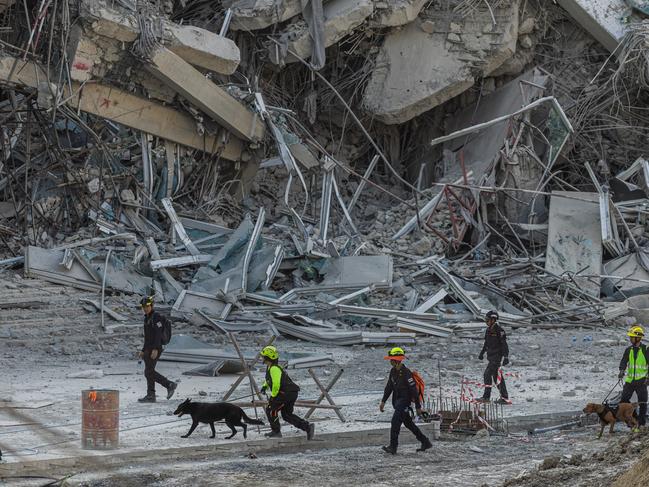
“The children whose families were lost, they walked over to our two dogs during their break. They came to play with our dogs, even as their head injuries were clearly visible,” he told AFP.
It was then that he realised the dogs were doing more than just searching for the victims – they made people feel “less anxious and less sad, even for a short while”.
He said he felt it was important to introduce the dogs to victims’ relatives for them to meet the vital team members searching for their loved ones.
“They are very valuable part of the crew,” said Alongkot, “A team that is on a mission to search for many more people around the world.”
PREGNANT WOMAN TRAPPED FOR 60 HOURS RESCUED
Rescuers in earthquake-ravaged Mandalay have pulled a pregnant woman alive from the rubble of an apartment building — nearly 60 hours after the disaster struck – as the death toll exceeded 2000.
The dramatic rescue happened at dawn in Myanmar, with exhausted emergency crews working through the night, desperately searching for any sign of life in the wreckage of the Sky Villa apartment.
Incredible footage shows the moment the woman was gently extracted from the wreckage, strapped to a stretcher to stabilise her spine, and carefully lowered by rope to a second rescue team waiting two storeys below.
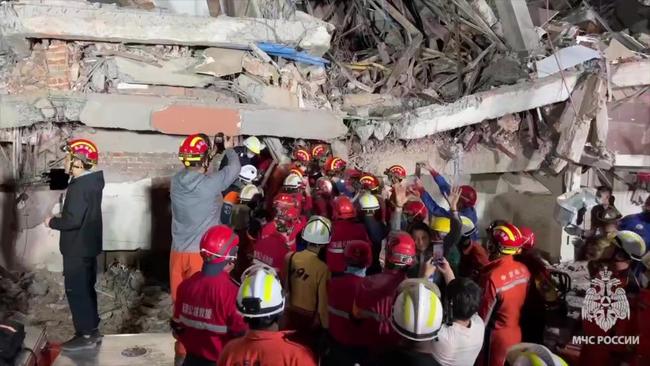
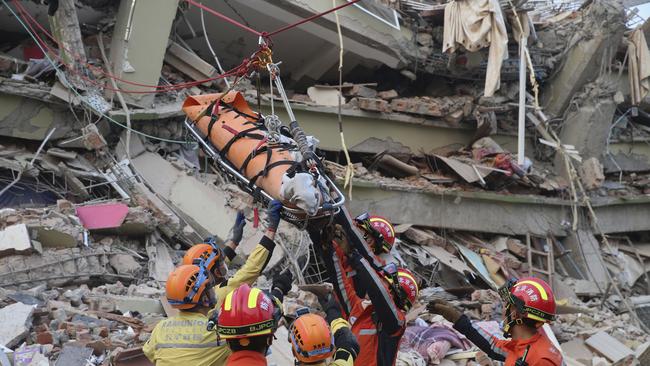
Chinese rescue crews saved another five people at a different location in Mandalay, including a young girl.
But as hope fades, officials in Myanmar and Thailand admit they are now recovering more bodies than survivors.
A desperate scene unfolded at a collapsed apartment block in Myanmar’s second biggest city on Sunday evening, when rescuers thought they had saved the life of a pregnant woman trapped under the rubble for more than 55 hours.
They amputated her leg to free her, but after pulling her out she was pronounced dead.
“We tried everything to save her,” said one of the medical responders, but she had lost too much blood from the amputation.
Residents say the air is thick with the “smell of death,” as soaring temperatures above 40C accelerate the decomposition of those still trapped beneath the ruins.
WEEK OF MOURNING
Myanmar declared a week of national mourning for the country’s devastating earthquake, as the death toll rose to 2056, with more than 3900 people injured and 270 still missing.
National flags will fly at half-mast until April 6 “in sympathy for the loss of life and damages” from Friday’s massive 7.7-magnitude quake, the ruling junta said in a statement.
Three Chinese nationals are among the dead, China’s state media said, along with two French people, according to the foreign ministry in Paris.
At least 19 deaths have been confirmed hundreds of kilometres away in Thailand’s capital Bangkok, where the force of the quake caused a 30-storey tower block under construction to collapse.
However, with communications down in much of Myanmar, the true scale of the disaster has yet to emerge and the death toll is expected to rise significantly.
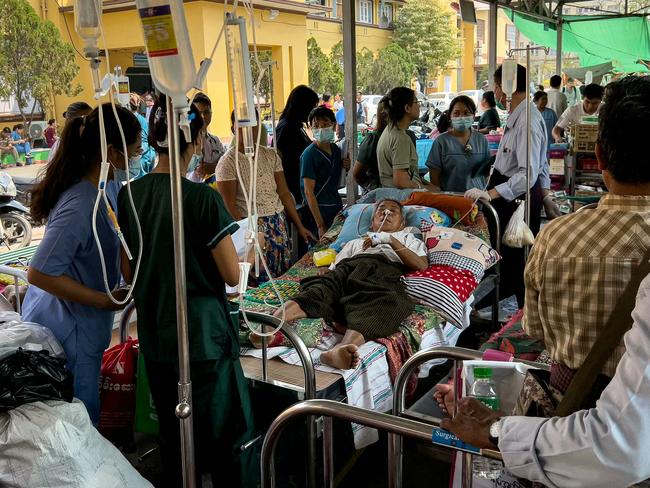
Mandalay, one of the worst-affected cities and the country’s second largest, has more than 1.7 million inhabitants.
“The situation is so dire that it’s hard to express what is happening,” said Aung Myint Hussein, chief administrator of Mandalay’s Sajja North mosque.
People camped out in the streets across Mandalay for a third successive night, either unable to return to ruined homes or nervous about the repeated aftershocks that rattled the city over the weekend.
Some had tents but many, including young children, simply bedded down on blankets in the middle of the roads, trying to keep as far from buildings as possible for fear of falling masonry.
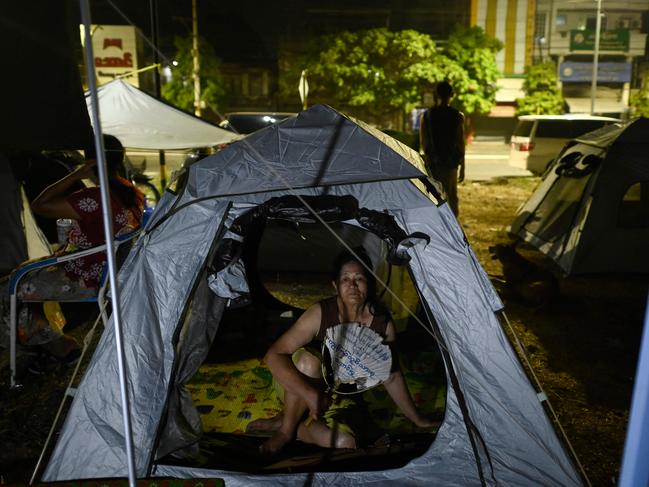
HOSPITAL RELOCATES TO CAR PARK
Hundreds of patients, including babies, the elderly and Buddhist monks, lie on gurneys in a hospital car park in the sweltering heat of Mandalay, a city still living in fear of aftershocks three days after a deadly quake struck Myanmar.
Mandalay General Hospital — the city’s main medical facility — has around 1000 beds but despite high heat and humidity, most patients are being treated outside in the wake of the massive earthquake.
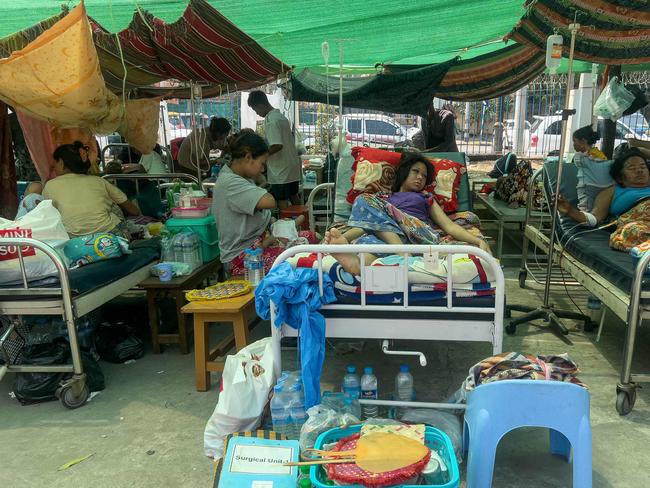
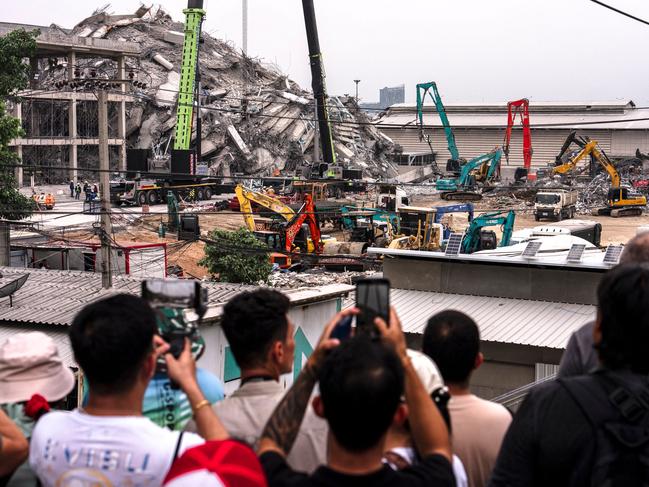
The evacuated patients lay on gurneys in the hospital car park, many with only a thin tarpaulin rigged up to shield them from the fierce tropical sun.
Relatives did their best to comfort them, holding hands or waving bamboo fans over them.
“This is a very, very imperfect condition for everyone,” said one medic, who asked to remain anonymous.
“We’re trying to do what we can here. We are trying our best.”
The sticky heat has exhausted rescue workers and accelerated body decomposition, which could complicate identification.
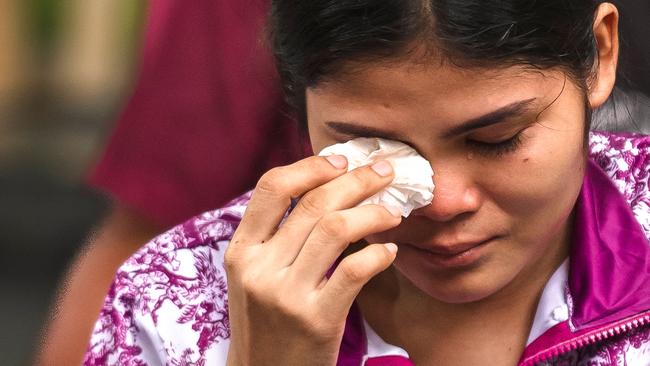
But traffic began returning to the streets of Mandalay on Monday, and restaurants and street vendors resumed work.
Hundreds of Muslims gathered outside a destroyed mosque in the city for the first prayer of Eid al-Fitr, the holiday that follows the Islamic fasting month of Ramadan.
Muslim worshippers, meanwhile, gathered near a destroyed mosque in the city on Monday morning for the first prayer of Eid al-Fitr, the holiday that follows the Islamic fasting month of Ramadan.
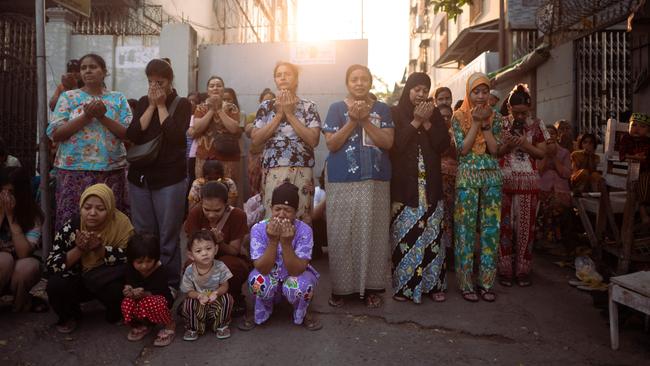
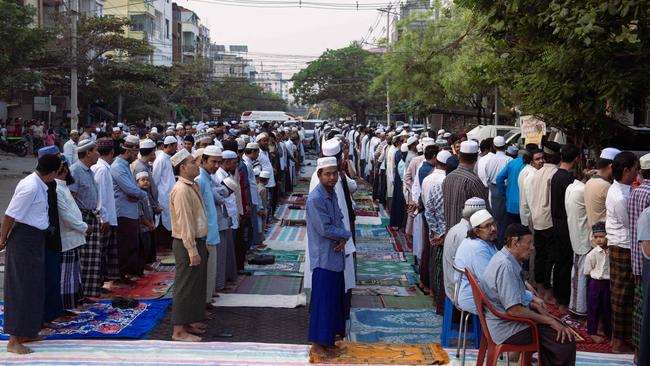
Funerals for hundreds of victims were also expected to take place on Monday local time.
In the Thai capital of Bangkok – about 1000km away from Mandalay – rain fell on Monday morning at the site of a collapsed building that had been under construction at the time of Friday’s quake.
Most of the deaths were workers killed in the tower collapse, while most of the missing are believed to be trapped under the immense pile of debris where the skyscraper once stood.
Rescue workers raced over the weekend to find survivors, using large mechanical diggers to uncover rubble while distressed family members waited nearby.
Sniffer dogs and thermal imaging drones have been deployed to seek signs of life in the collapsed building, which is close to the Chatuchak weekend market popular among tourists.
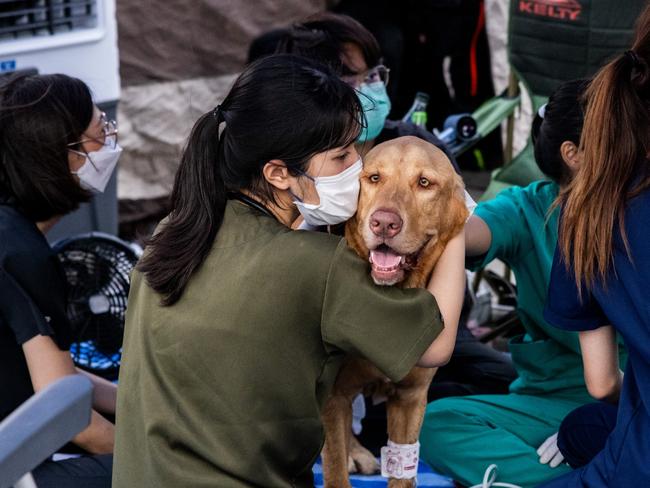
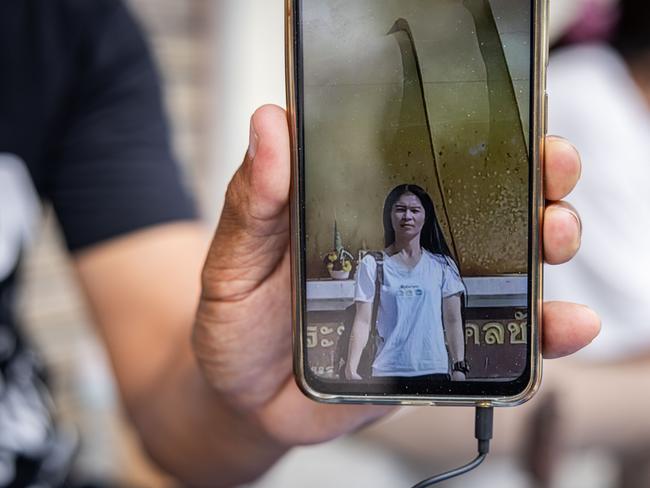
TONGA HIT BY 7.0 QUAKE
A 7.0-magnitude earthquake struck offshore near Tonga on Sunday, two days after the massive earthquake in Myanmar and neighbouring Thailand.
The shallow quake hit 79km south-southeast of the village of Pangai at 1219 GMT on Sunday, the US Geological Survey said.
Authorities in the Pacific island nation briefly issuing a tsunami warning before giving the all-clear.
The US tsunami warning system initially said “hazardous tsunami waves from this earthquake are possible within 300km of the epicentre along the coasts of Tonga”.
It subsequently revised the assessment, saying “the tsunami threat from this earthquake has now passed”, but authorities in Tonga issued further warnings.
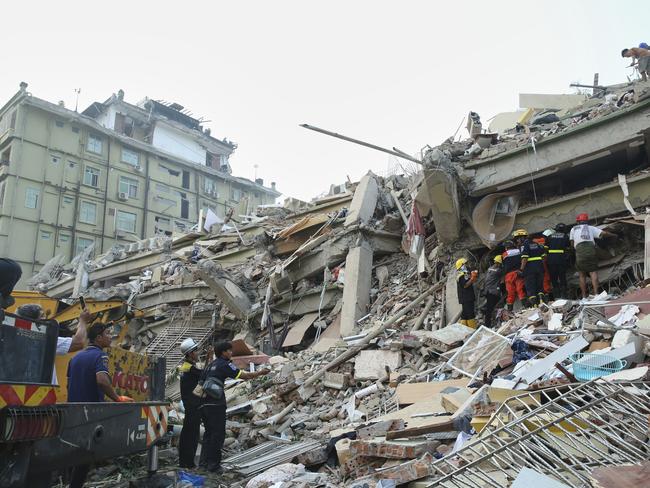
SURVIVOR ACCOUNTS
On Saturday, rescuers pulled a woman alive from the wreckage of a collapsed apartment building in Mandalay, 30 hours after the devastating quake hit.
Applause rang out as Phyu Lay Khaing, 30, was brought out of the Sky Villa Condominium by rescuers and carefully removed from the rubble by stretcher.
Her husband Ye Aung, who had been waiting anxiously for news, embraced her as the stretcher was lifted down.
“In the beginning, I didn’t think she would be alive,” Ye Aung told AFP as he waited for his wife to emerge from the debris.
“I am very happy that I heard good news,” said the trader, who has two sons with his wife – eight-year-old William, and Ethan, five.
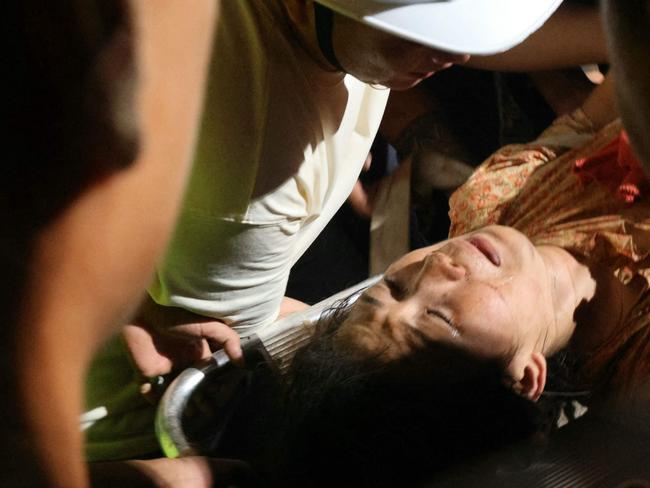
As the ambulance drove away to hospital, Ye Aung was seen through the window clutching his wife’s hand.
A Red Cross official told AFP earlier that more than 90 people could be trapped under the remains of the apartment block.
Tea shop owner Win Lwin picked his way through the remains of a collapsed restaurant on a main road in his neighbourhood early on Sunday, tossing bricks aside one by one.
“About seven people died here” when the quake struck, he told AFP. “I’m looking for more bodies but I know there cannot be any survivors.”
About an hour later, a small aftershock struck, sending people scurrying out of a hotel for safety, following a similar tremor felt late Saturday evening.
And around 2pm (3am EDT), another aftershock – of 5.1-magnitude according to the US Geological Survey – sent people into the streets in alarm once again, temporarily halting rescue work.
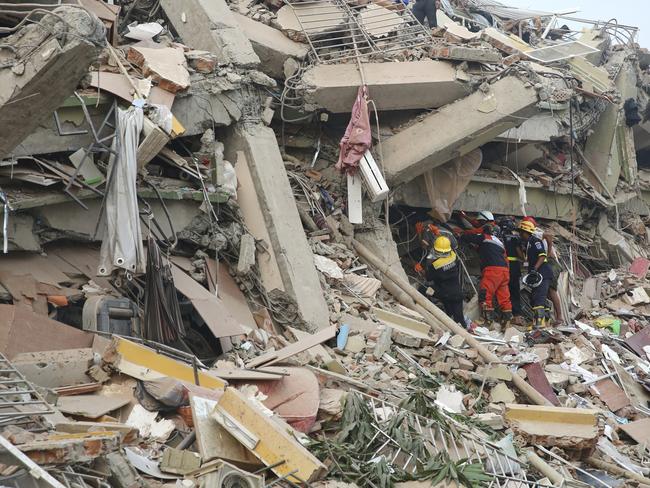
At a destroyed Buddhist examination hall in Mandalay, Myanmar, San Nwe Aye, sister of a 46-year-old monk missing in the collapsed hall, appeared in deep distress, and told AFP she has heard no news about his status.
“I want to hear the sound of him preaching,” she said. “The whole village looked up to him.”
More Coverage
Originally published as Myanmar earthquake: Death toll expected to exceed 3000




